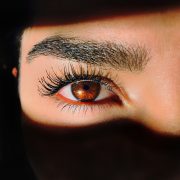Body image and health issues.
No matter how bad your health is,
it lasts a lifetime
1. Question:
I am overweight (89 kg/height 168 cm, blond), and I am a dense eater. I have this question. Herpes in the area of my nose is getting inflamed. My friend (tall and slender, 180cm/70kg, brunette) also has herpes on his lip, but not so brightly visible. Why is it like this? What to do? Photo attached.
Answer:
Given your skin type, you have white (lymphatic) skin and the problem of redness is clearly visible. A friend, who has a sanguine skin type, does not show as much redness.
Avoid alcohol and hypothermia. Consult your doctor about the choice of treatment.
2. Question:
I have an oily scalp. But why is my hair liquid?
Answer:
Hair is usually sparse because the heavy sweat secretion inherent in your skin kills hair.
The baldness itself is rare in lymphatics (phlegmatics) and melancholics, although very common in sanguines, indicating a tendency to arthritis.
Rare hair may also be hereditary.
3. Question:
I have bad teeth. Ever since I was a kid, I’ve been taken to the doctor and had fillings put in. I know all about toothache. I’ve had tests. Nothing. There are no serious diseases and everything is normal. My mom has perfect teeth! What’s that?
Answer:
As they say, “teeth are a bone inherited from the father.” It’s probably hereditary. And no matter how good your mother’s teeth are, alas.
Brush your teeth with the right toothpaste (without too much fluoride and calcium), one that suits your teeth (consult your doctor).
4. Question:
Do psychology and clinical psychology have much in common? Do clinical psychologists treat illnesses? And another question, what is the process called when determining the normality or abnormality of an offender in terms of psychology?
Answer:
Psychology (from Greek psyche – soul and logos – doctrine, science) – the science of the regularities of development and functioning of the psyche as a special form of life activity.
Clinical psychology (from Greek klinike – healing, kline – bed, bed) is a field of medical psychology dealing with the issues of psychic factors of origin and course of diseases, influence of diseases on personality, psychological aspects of healing effects.
I.e. if psychology is a science, then clinical psychology is its part, its direction.
Clinical psychologists are not doctors. But they take part in clinical, forensic-psychological expertise.
Forensic-psychological expertise (from Lat. expertus – experienced) – one of the main forms of practical application of special psychological knowledge in the criminal process. The psychologist establishes on the basis of knowledge, experience, special techniques and methodologies the normal state of the suspect, fixes deviations, determines the state at the time of committing an atrocity. The whole spectrum of the suspect’s personality is analyzed.
5. Question:
My skin is darkish from birth. What does that mean?
Answer:
You have sanguine skin that loves the sun (unfortunately you didn’t send your photo). The sun enriches it with new energy. Such skin quickly tans and darkens.
It is a sign of energy, optimism, health, self-confidence (note – masculine qualities), a rich and free nature, enterprising, active, interesting.
Disease predispositions – arthritis, tendency to deposits, the source of which is the liver, blood rush to the head.
To determine in more detail – you need to see you.
6. Question:
I am thin and not very tall (photo attached). What diseases am I prone to based on my photo?
Answer:
You belong to the thinking type in its pure form – cerebrotonia, ectomorphism. Your somatotype – type of a body build according to classification 1-1-7, speaks about propensity to everything that is written in the column of the above mentioned Table. Actually, pure types are rare. More often it’s mixed.
Diseases – headaches, fatigue, lower back pain. But good spinal development, correct posture and good tone of the upper leg muscles. Vision problems (see an ophthalmologist). A mild shampoo is appropriate for your hair.
Pay attention to your urinary and sexual system. You are prone to genital colds (be afraid of drafts).
Take more time to rest and sleep.
I recommend taking up fitness or general body exercises. Pay attention to medical and folk techniques of cold water dousing.
7. Question:
What is the relationship between emotions and diseases? What are the main somatic diseases?
Answer:
It is an indisputable fact that any emotional states, especially long, protracted negative emotions are accompanied by changes in the functional systems of the body, primarily the cardiovascular system, and are inseparable from them.
The heart of an adult (in a calm state) works at a rate of (on average) 70 contractions per minute. In other words, the heart contracts 70 times a minute and relaxes the same number of times (systole-diastole), hence, under the influence of the incoming blood into the blood vessels, the arteries dilate and contract (70 p./min.) to push the blood through the bloodstream. This amounts to 4,200 contractions of the heart and arteries per hour, 100,800 per day, and about 37 million per year, over two billion contractions in sixty years of life.
It is clear that with muscular work and with increased temperature the number of contractions increases. Many emotions (rarely positive and in most cases it is negative) are accompanied by intensification, increased heart and vascular contractions up to 100-120 and more per minute. It is logical that the more emotions, the more frequent and prolonged they are, the more the cardiovascular system is worn out, the more conditions are created for the development of atherosclerosis, especially if emotions are accompanied by increased blood pressure in the arteries.
Chronic somatic diseases – hypertension, atherosclerosis, chronic diseases of the stomach, intestines and kidneys (may be manifested by neurasthenic symptoms), restless sleep, sometimes with frightening dreams, tearfulness and rapid fatigue.
8. Question:
Please tell me, what psychological type of personality is prone to myocardial infarction from the psychosomatic point of view? I am interested in description and characterization. Thank you. Lydia.
Answer:
Hello Lydia!
Representatives of different psychological personality types are predisposed to different diseases.
The greatest propensity to myocardial infarction is shown by people belonging to the so-called coronary type of personality.
Such people are characterized by such qualities as perseverance in achieving the goal, determination, ability and desire to compete. They are not satisfied with small, the level of their claims is quite high. Their activities are diverse, and there is always a lack of time for the realization of numerous plans. This person is constantly in the tone, work ahead, he does not allow himself to relax, overcoming fatigue by force of will. This is not just a workaholic; this is a person who is in a state of constant tension, (even after the end of the day, at home and on the way to work).
This person is full of plans, continues to work tirelessly. However, if there is a difficult situation out of control, such a person may develop a disease.
This is choleric, sanguine with a predominant choleric component.
The disease develops according to the following scenario: at first there are desperate attempts to restore lost positions. Energetic actions are necessary first of all for self-assertion of the personality and at an unfortunate coincidence of circumstances (the result of actions taken is negative, the situation continues to be uncontrollable) the person gives up and becomes ill.
9. Question:
Hello! Please tell me, about a year ago I “acquired” around my waist a kind of “visceral fat belt”. What is it? Thank you. Xenia.
Answer:
Hello Xenia!
Visceral (i.e. internal fat), accumulates in muscle tissue, around the heart, kidneys, liver, thus leading to diabetes, cardialgia and other health problems.
It poses a big enough danger if you don’t change your lifestyle to a more dynamic and cheerful one – as both of these factors fundamentally affect this problem.
The norm of internal fat for a healthy person is about one liter.
By external signs, the presence of such fat can be determined by the increase in the waist (for women of mature age not more than 90 cm, men of mature age – 105 cm – are the limit marks). For young people – not to exceed 80 cm and 85 cm, respectively. In medicine, the diagnosis is made with the help of magnetic resonance imaging.
The reason for the appearance of such fat in the body is low mobility, nervous breakdowns and stress, smoking and alcohol, as well as elementary laziness (with a trail of violation of normal nutrition, excessive sleeping and loss of muscle tone and physical form of a healthy person).
Do not drastically change your lifestyle, which can negatively affect your health. You should not use diets with abrupt changes in dietary intake, changes in meal times and starvation.
From the risk group it is worth to get out slowly. Start with fitness and jogging – no more than 30 minutes a day for a month, followed by increasing the load to 1-2 hours a day.
10. Question:
Hello! Give me a brief summary of the signs of somatic pain.
Answer:
Character – acute intense, localization – point in the place of irritation, rhythmicity (relationship to food intake, time of day) – absent, duration – constant, painfulness on palpation (probing) – in the place of localization of the diseased organ.
Treatment: drug therapy – ineffective, even contraindicated, psychological therapy – recommended, health promotion methods – depending on the contraindication to the individual person.
11. Question:
Hello, I can’t find information anywhere about the “type of ulcer patient”. I know that ulcer is a psychosomatic disease, as I am studying to be a medical worker. But I can’t find these types. Help!
Answer:
Overbeck and Biebl (1975) categorize ulcer patients into 5 types:
I. The psychologically “healthy” ulcer patient: becomes ill with ulcers as a single psychosomatic reaction under massive stress and severe regression of the self.
II. Ulcer patient with character neurosis: formation of pseudo-independent reactions with constant experience of resentments, failures.
III. Sociopathic ulcer patient: patients with weak “I”, excessive dependence, become ill at minor external refusals of love and appeal to self.
IV. “Psychosomatic” ulcer patient: personalities with poor imagination, see in others only themselves and at specific stresses and crises habitually psychosomatic reaction.
V. “Normopathic” ulcer patient is excessively focused on the normativity of behavior with distinct limitations of the “I”. Ulcer occurs against the background of chronic stress overload.
Another classification (Loch, 1963, Freyberger, 1972, Balint, 1969) distinguishes 2 types.
– Hyperactive (the desire for addiction is rejected consciously, there is concern for others, leadership);
– passive (patients enjoy the benefits of dependence, do not take steps towards independence, unconsciously afraid of being abandoned).
Good luck to you, in your study of medicine!













